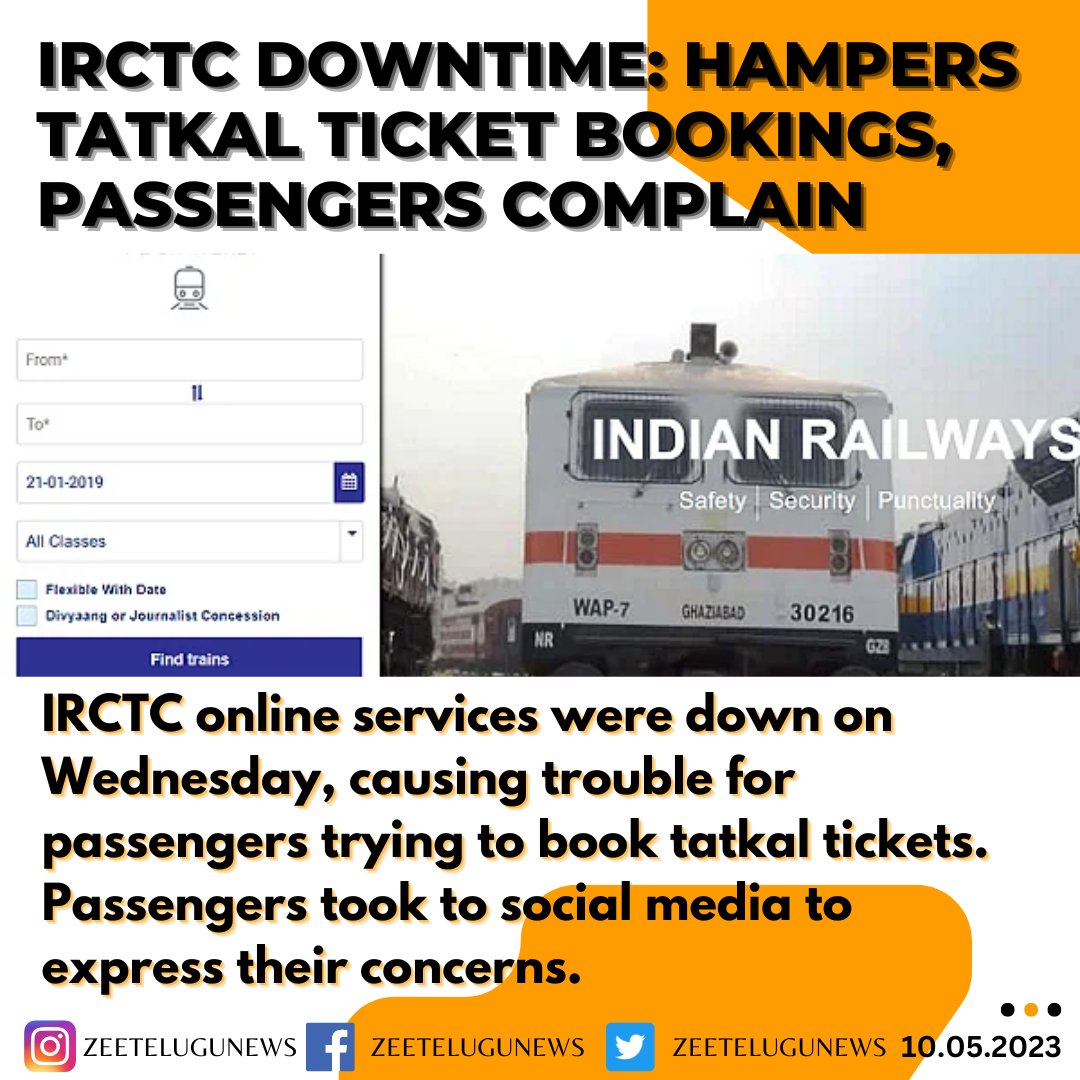


The Indian Railway Catering and Tourism Corporation's ticket site experienced a technological glitch for the third time in a month, causing inconvenience to passengers. The outage occurred during the peak Tatkal booking period, leaving many users unable to access the site's services. Social media was flooded with complaints from frustrated customers, highlighting the need for better technology and management by IRCTC.
IRCTC's Persistent Technical Glitches: A Cause for Concern
The Indian Railway Catering and Tourism Corporation (IRCTC), the e-ticketing arm of the Indian Railways, has been facing a string of technical glitches, causing inconvenience to passengers and raising concerns about the reliability of its services.
Recent Outages
In March 2023, IRCTC's ticket website experienced its third outage in a month. The latest outage occurred during the Tatkal booking period, when passengers are allowed to book tickets 24 hours before the scheduled departure of the train. The outage left many users unable to access the site, leading to frustration and missed opportunities for travel.
Past Glitches
IRCTC has encountered similar technical glitches in the past. In February 2023, the website experienced an outage that affected bookings for several hours. In January 2023, the site crashed due to high demand during the peak Tatkal booking period.
Reasons for Glitches
The exact reasons for the IRCTC outages are not clear. However, experts speculate that the site may be struggling to handle the high volume of traffic during peak booking periods. IRCTC's infrastructure may also be outdated or insufficient to meet the growing demand for online ticketing services.
Impact on Passengers
The technical glitches have caused significant inconvenience to passengers. Missed bookings can lead to lost time and travel expenses. Frustration and disappointment are also common reactions among affected users.
Social Media Complaints
Social media has been flooded with complaints from frustrated customers following the latest IRCTC outage. Passengers have expressed their dissatisfaction with the unreliable services and demanded improvements from the organization.
Top 5 FAQs
Q1: What is the reason for the recurrent IRCTC outages? A1: The exact reasons are unknown, but factors such as high traffic volume and outdated infrastructure may be contributing.
Q2: How long do IRCTC outages typically last? A2: The duration of outages varies. Recent outages have lasted several hours.
Q3: What should I do if I encounter an IRCTC outage? A3: Try accessing the website again later. If the outage persists, contact IRCTC's customer service for assistance.
Q4: What measures is IRCTC taking to address the glitches? A4: IRCTC has not publicly disclosed any specific measures it is taking, but improvements in infrastructure and capacity may be necessary.
Q5: Has IRCTC experienced technical glitches in the past? A5: Yes, IRCTC has encountered similar outages in the past, including incidents in February and January 2023.

A recent RBI bulletin has revealed that the profitability of Indian companies has nearly tripled since the onset of the Covid-19 pandemic. The corporate profit-to-GDP ratio has reached a 17-year high, with large companies emerging as the primary contributors to this increase. This surge has been attributed to pandemic-induced pent-up demand, manufacturing resilience, and improved operational efficiency. However, despite this growth, corporate credit growth remains muted as firms are sitting on significant cash reserves, reducing their reliance on bank loans.

The Employees’ Provident Fund Organisation (EPFO) has announced five major changes to the Employees’ Pension Scheme (EPS) that will significantly impact the retirement savings of salaried employees. These changes include a revised method of pension calculation, an increase in the maximum pension limit from Rs 7,500 to Rs 15,000 per month, and a reduced minimum age for drawing pension from 58 to 50 years. These revisions aim to simplify pension access, increase benefits, and improve portability for members across the country. This move, following a Supreme Court directive, is expected to provide major relief to pensioners and ensure a fair and realistic computation for employees.

Major stock indexes trended downwards on Wednesday as earnings reports pour in and trade tensions between the US and China resurface. The Nasdaq, Dow Jones Industrial Average, and S&P 500 all ended the day in the red, with pressure from a report that the White House is considering export restrictions on China. Meanwhile, gold prices saw a slight increase and the 10-year Treasury yield ticked lower. Among corporate news, Netflix reported weaker-than-expected quarterly profit while Intuitive Surgical saw a boost in shares after exceeding expectations. DraftKings also rose upon news of their acquisition of Railbird, while Tesla and IBM prepared for their third-quarter results. Lastly, AT&T and Alphabet had mixed revenue results, causing their stocks to decline and fluctuate.

Zoho, the popular business productivity software company, is making its entry into the consumer fintech space with the launch of Zoho Pay. This standalone app will also be integrated into the company's chat platform, Arattai, allowing users to easily send and receive money while chatting with others. Zoho plans to expand their fintech offerings to include lending, broking, insurance, and wealth-tech, and sees Zoho Pay as a key component of their overall financial services ecosystem. This move also positions Arattai as a competitor to WhatsApp in the Indian market, as it experiences a surge in downloads driven by government support and privacy concerns surrounding global tech platforms.

Multinational digital tech giant Philips, known for its innovative products, lost a 20-year legal battle before the Delhi High Court. The case involved allegations of patent infringement against an Indian company in the manufacturing and sale of Video Compact Discs (VCD). The court's decision was a blow to Philips, highlighting the importance of protecting intellectual property in the business world.

Concord Control Systems, Elecon Engineering, and Welcure Drugs & Pharmaceuticals are among the companies to trade ex-date for corporate actions such as bonus issues, interim dividends, and stock splits. The ex-date is an important marker for investors, as those purchasing shares on or after this date will not be eligible for the announced benefits. Shareholders of these companies can expect to receive a bonus issue, interim dividend, and stock split in their portfolios, aiming to enhance shareholder value, reward investments, and improve stock liquidity.

Rediffusion's latest campaign for Rasna, titled "India ke Khushiyon ka Vitamin" aims to redefine the mother-child relationship in the modern world. By highlighting the brand's fruit-based drinks as a healthy and refreshing drink for kids, the campaign acknowledges the role of mothers as active partners in their child's growth and development. With a focus on Vitamin Josh and Vitamin Hasi, this new campaign highlights how Rasna is the perfect choice for today's multitasking mothers.

The Indian stock markets took a break on Wednesday in observance of Bali Pratipada, a day that holds cultural significance. The Asian markets, on the other hand, showed a mixed performance with Japan's Nikkei 225 declining, Singapore's Straits Times gaining, and Hong Kong's Hang Seng and Taiwan's Weighted Index decreasing. The previous day's Muhurat Trading session saw slight gains in Indian markets and top gainers included Cipla and Bajaj Finserv.

Investors in the Indian stock markets are getting a break from trading today with markets closed for Diwali Balipratipada. This traditional holiday marks the end of Diwali festivities and symbolizes Lord Vishnu's victory over King Bali. Trading in equity, derivatives, and commodity markets will remain suspended for the day, with normal trading resuming tomorrow. This break is a part of the exchanges' annual holiday list, aligning with important national and religious occasions.

Branded mithai sales are expected to rise by 15-20% during this Diwali season in India, due to a surge in corporate gifting, retail demand, and product innovation. The packaged sweets market in India is projected to reach 27,600 by 2033, with a 16% annual growth rate, as per IMARC Group. With a growing taste for luxury and customization in gifting, Indian brands are expanding rapidly and introducing new products, such as millet-based and vegan options, to cater to changing consumer preferences.